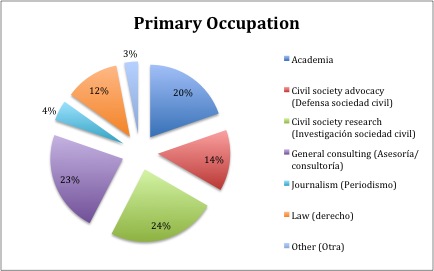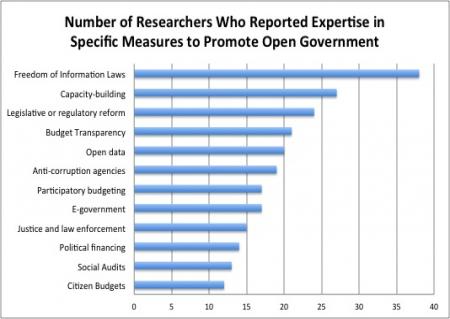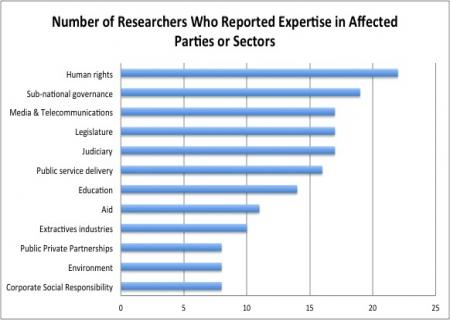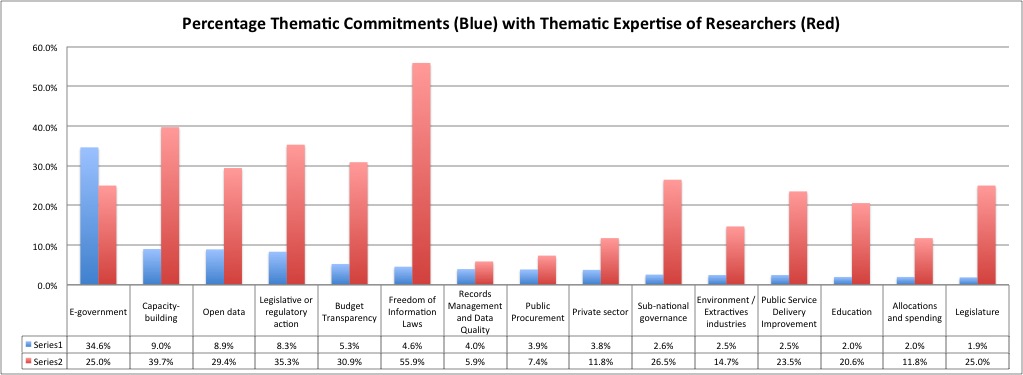IRM National Researchers Trained and Ready
The OGP’s Independent Reporting Mechanism (IRM) has just finished training the IRM national researchers for 59 of the 64 OGP participating countries. These researchers are now beginning the processes of evaluation in each of their countries. As part of this training, IRM researchers practiced applying the IRM procedures, familiarized themselves with the IRM tools, and shared their expertise between one another to strengthen the IRM’s reports overall.
The IRM’s structure and mandate has created a network of open government professionals with a wide variety of specific expertise. The IRM has mapped this expertise network, so that researchers and the OGP community can best know the skills and fortes the IRM brings to bear in its reporting.
Below are some highlights, and the full data on researcher expertise is available here. Because some of the IRM researchers work as teams, more than 64 experts are represented.
General Demographics
Almost 40% of IRM researchers are women or have a female lead on the research team. As well, when they are not preparing their national progress reports, IRM researchers work in a wide variety of occupations.
Primary Area of Expertise
When asked to indicate their primary area of expertise, over 20% of IRM researchers selected freedom of information (FoI) laws.
Besides FoI, the following word cloud shows the frequency of other responses. Click here to see the frequency distribution.
General Experience
Beyond their primary areas of expertise, IRM researchers have skills in a variety of specific measures for promoting open government, and experience working with a wide variety of sectors relevant to open government. These charts show the top 15 most common responses. Researchers can have experience in more than one topic.
Matching Expertise with Need
Clearly, the IRM researchers are diverse experts. But how does their experience match up to the open government commitments they evaluate? To find out, one can compare the percentages of researchers with expertise in a specific open government theme to the percentages of open government commitments on that theme, with some caveats.[1] If we consider the top twelve most common themes for OGP commitments, we see the following matchup:
This table shows that, for example, around 9% of OGP commitments involve capacity-building, and almost 40% of IRM researchers have experience with capacity-building. In fact, a higher percentage of IRM researchers have expertise in each of these open government themes than the percentage of commitments that are relevant to that theme. (The only exception is “e-government”, a characteristic of OGP action plans brought up in various IRM reports and civil society publications.)
Of course, each individual researcher is likely to come across a topic about which they are relatively less knowledgeable. To respond to this, the IRM encourages networking and peer exchange, learning, and support among the IRM researchers.
As always, if you would like to get in touch with your country’s IRM researcher, or find an IRM researcher with specific thematic expertise, email [email protected]
1. This data is from the first action planAction plans are at the core of a government’s participation in OGP. They are the product of a co-creation process in which government and civil society jointly develop commitments to open governmen... commitments made by the eight Cohort 1 countries in 2011-12 and the 36 Cohort 2 countries in 2012-2013, so it might not be generalizable to the many commitments in Cohorts 3 and 4’s first action plans, or Cohorts 1 and 2’s second action plans. Additionally, some of the thematic groupings for researcher expertise are slightly different than the thematic groupings for commitments, so some of the comparisons may not be 100% analogous.






